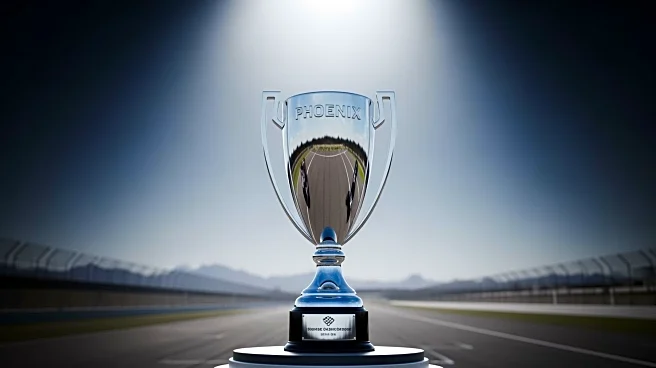What's Happening?
Kyle Larson, the only former Cup champion among the four drivers competing for the title at Phoenix Raceway, is facing scrutiny over whether his past success makes him the favorite. Larson, who has not won in 23 races, is up against Joe Gibbs Racing's
Denny Hamlin, Chase Briscoe, and Hendrick's William Byron, each of whom has had a strong season. Larson's crew chief, Cliff Daniels, is also the only one among the competitors with a Cup title. Despite Larson's previous victory in 2021, the dynamics have changed with the introduction of the Next Gen car, which limits customization. Larson's team is preparing for a challenging race, acknowledging the strengths of their competitors.
Why It's Important?
The outcome of the Phoenix race has significant implications for the NASCAR Cup Series, as it will determine the season's champion. Larson's experience and past success could provide an edge, but the competition is fierce, with each driver having a compelling case for the title. The race also highlights the evolving nature of NASCAR, with the Next Gen car changing how teams prepare and compete. The result will impact team strategies, sponsorships, and the drivers' standings in the sport. A win for Larson could reinforce his status as a top driver, while a victory for any of the other contenders could mark a shift in the competitive landscape.
What's Next?
As the race approaches, teams will intensify their preparations, focusing on strategy and car performance. The outcome will likely influence future races and team dynamics, with potential changes in crew strategies and driver lineups. Fans and analysts will be watching closely to see if Larson can leverage his past experience to secure another title or if a new champion will emerge. The race will also serve as a test for the Next Gen car's impact on competition, potentially guiding future NASCAR regulations and team approaches.
Beyond the Headlines
The race at Phoenix is not just about the championship but also about the broader implications for NASCAR's future. The introduction of the Next Gen car represents a shift towards standardized parts, which could level the playing field but also challenge teams to innovate within new constraints. This evolution may affect the sport's appeal, sponsorship dynamics, and fan engagement. The race could also influence how teams approach driver development and crew management, as they adapt to the changing technological landscape.















